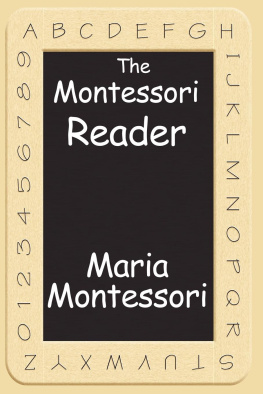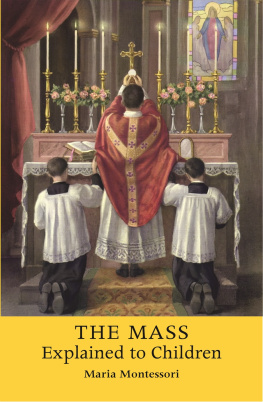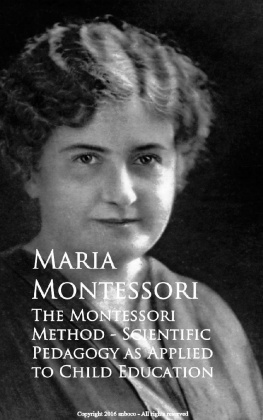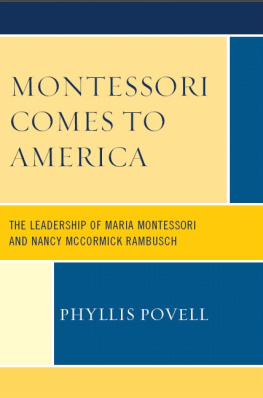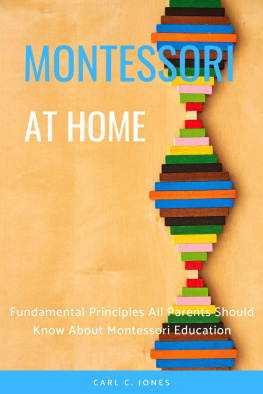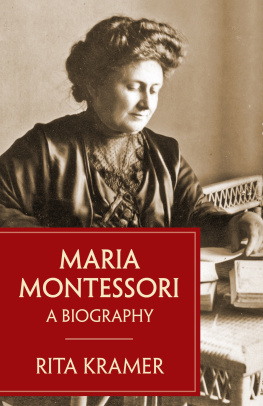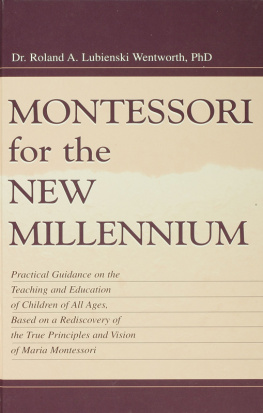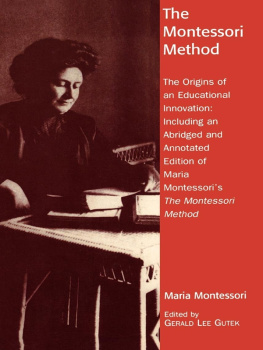The Montessori Method
Preface to the American Edition
In February, 1911, Professor Henry W. Holmes, of the Division of Education at Harvard University, did me the honour to suggest that an English translation be made of my Italian volume, Il Metodo della Pedagogia Scientifica applicato all educazione infantile nelle Case dei Bambini. This suggestion represented one of the greatest events in the history of my educational work. To-day, that to which I then looked forward as an unusual privilege has become an accomplished fact.
The Italian edition of Il Metodo della Pedagogia Scientifica had no preface, because the book itself I consider nothing more than the preface to a more comprehensive work, the aim and extent of which it only indicates. For the educational method for children from three to six years set forth here is but the earnest of a work that, developing the same principle and method, shall cover in a like manner the successive stages of education. Moreover, the method which obtains in the Casa dei Bambini offers, it seems to me, an experimental field for the study of man, and promises, perhaps, the development of a science that shall disclose other secrets of nature.
In the period that has elapsed between the publication of the Italian and American editions, I have had, with my pupils, the opportunity to simplify and render more exact certain practical details of the method, and to gather additional observations concerning discipline. The results attest the vitality of the method, and the necessity for an extended scientific collaboration in the near future, and are embodied in two new chapters written for the American edition. I know that my method has been widely spoken of in America, thanks to Mr. S. S. McClure, who has presented it through the pages of his well-known magazine. Indeed, many Americans have already come to Rome for the purpose of observing personally the practical application of the method in my little schools. If, encouraged by this movement, I may express a hope for the future, it is that my work in Rome shall become the centre of an efficient and helpful collaboration.
To the Harvard professors who have made my work known in America and to McClures Magazine, a mere acknowledgement of what I owe them is a barren response; but it is my hope that the method itself, in its effect upon the children of America, may prove an adequate expression of my gratitude.
Maria Montessori
Dr. Montessoris Own Handbook
Preface
If a preface is a light which should serve to illumine the contents of a volume, I choose, not words, but human figures to illustrate this little book intended to enter families where children are growing up. I therefore recall here, as an eloquent symbol, Helen Keller and Mrs. Anne Sullivan Macy, who are, by their example, both teachers to myself and, before the world, living documents of the miracle in education.
In fact, Helen Keller is a marvelous example of the phenomenon common to all human beings: the possibility of the liberation of the imprisoned spirit of man by the education of the senses. Here lies the basis of the method of education of which the book gives a succinct idea.
If one only of the senses sufficed to make of Helen Keller a woman of exceptional culture and a writer, who better than she proves the potency of that method of education which builds on the senses? If Helen Keller attained through exquisite natural gifts to an elevated conception of the world, who better than she proves that in the inmost self of man lies the spirit ready to reveal itself?
Helen, clasp to your heart these little children, since they, above all others, will understand yon. They are your younger brothers: when, with bandaged eyes and in silence, they touch with their little hands, profound impressions rise in their consciousness, and they exclaim with a new form of happiness: I see with my hands. They alone, then, can fully understand the drama of the mysterious privilege your soul has known. When, in darkness and in silence, their spirit left free to expand, their intellectual energy redoubled, they become able to read and write without having learnt, almost as it were by intuition, they, only they, can understand in part the ecstasy which God granted you on the luminous path of learning.
Maria Montessori
Introductory Remarks
Recent years have seen a remarkable improvement in the conditions of child life. In all civilized countries, but especially in England, statistics show a decrease in infant mortality.
Related to this decrease in mortality a corresponding improvement is to be seen in the physical development of children; they are physically finer and more vigorous. It has been the diffusion, the popularization of science, which has brought about such notable advantages. Mothers have learned to welcome the dictates of modern hygiene and to put them into practice in bringing up their children. Many new social institutions have sprung up and have been perfected with the object of assisting children and protecting them during the period of physical growth.
In this way what is practically a new race is coming into being, a race more highly developed, finer and more robust; a race which will be capable of offering resistance to insidious disease.
What has science done to effect this? Science has suggested for ns certain very simple rules by which the child has been restored as nearly as possible to conditions of a natural life, and an order and a guiding law have been given to the functions of the body. For example, it is science which suggested maternal feeding, the abolition of swaddling clothes, baths, life in the open air, exercise, simple short clothing, quiet and plenty of sleep. Rules were also laid down for the measurement of food adapting it rationally to the physiological needs of the childs life.
Yet with all this, science made no contribution that was entirely new. Mothers had always nursed their children, children had always been clothed, they had breathed and eaten before.
The point is, that the same physical acts which, performed blindly and without order, led to disease and death, when ordered rationally were the means of giving strength and life.
The great progress made may perhaps deceive us into thinking that everything possible has been done for children.
We have only to weigh the matter carefully, however, to reflect: Are our children only those healthy little bodies which to-day are growing and developing so vigorously under our eyes? Is their destiny fulfilled in the production of beautiful human bodies?
In that case there would be little difference between their lot and that of the animals which we raise that we may have good meat or beasts of burden.
Mans destiny is evidently other than this, and the care due to the child covers a field wider than that which is considered by physical hygiene. The mother who has given her child his bath and sent him in his perambulator to the park has not fulfilled the mission of the mother of humanity The hen which gathers her chickens together, and the cat which licks her kittens and lavishes on them such tender care, differ in no wise from the human mother in the services they render.
No, the human mother if reduced to such limits devotes herself in vain, feels that a higher aspiration has been stifled within her. She is yet the mother of man.
Children must grow not only in the body but in the spirit, and the mother longs to follow the mysterious spiritual journey of the beloved one who to-morrow will be the intelligent, divine creation, man.

